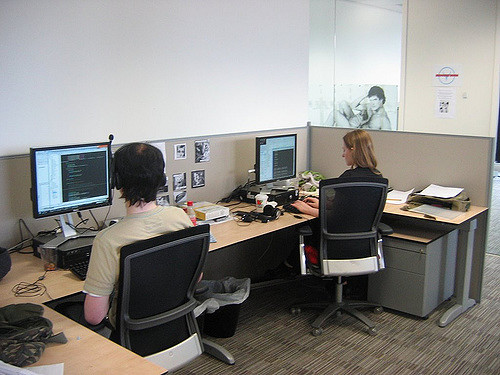
The college admissions scandal has brought concerns about meritocracy to the fore, but sociologists know that the myth of meritocracy also extends beyond college and into the workplace. Recently Daniel Laurison talked to The Atlantic about his new book, The Class Ceiling: Why It Pays to Be Privileged. Laurison and his coauthor, Sam Friedman, studied how elites in London profited from their privilege. In addition to being able to rely on financial assistance from parents when they were starting out in their career, Laurison and Friedman found that the culture and personnel of professional firms benefited upper-class workers.
One way that affluent workers get a leg up is that they are more likely to be similar to those who are already in the workplace, and informal systems of “sponsorship” often operate as workers helping out others who are similar to them. Laurison said,
“One of the big ideas of the book, for me, is it’s really hard for any given individual in any given situation to fully parse what’s actual talent or intelligence or merit, and what’s, ‘Gosh, that person reminds me of me, or I feel an affinity for them because we can talk about skiing or our trips to the Bahamas.’ Part of it is also that what your criteria are for a good worker often comes from what you think makes you a good worker.”
Another challenge for non-elites in the workplace are the unwritten rules. Laurison and Friedman pointed out how the culture of “studied informality” of one television studio actually functioned as an unwritten dress code, with right and wrong ways to be informal. Laurison told The Atlantic,
“There were all kinds of things, like who puts their feet up on the table and when they do it, when they swear—things that don’t seem like what you might expect from a place full of high-prestige, powerful television producers. But that was in some ways, I think, more off-putting and harder to navigate for some of our working-class respondents than hearing “just wear a suit and tie every day” might have been. The rules weren’t obvious, but everybody else seemed to know them.”
Laurison and Friedman advocate for shifting workplace culture to be more similar to codes of conduct familiar to middle and working class individuals, not simply trying to teach upper-class codes to those who are trying to climb the ladder. And, of course, they note that if wages weren’t so stratified both within and between workplaces there wouldn’t be such extreme economic consequences to these systems of informal knowledge and networking.

Comments 7
Natasha Flaherty — June 28, 2021
Thanks for the update and quick reply. I'll be sure to keep an eye on this thread. Looking for the same issue. Bumped into your thread. Thanks for creating it. Looking forward for solution. tellpopeyes
John Smith — July 9, 2021
Yes, employers should definitely discuss stuff with the workers. I used to be a trucker at one company but got fired for a still unknown reason.
Balance Blind — July 10, 2021
Haven't you tried to reach out to them? That's weird to fire people for no reason. Anyway, I'm sure you won't be unemployed for long. I can suggest you this website if you're interested in finding a new place to work. It has a lot of decent vacancies for you. That's how I got my job, so I'm sure you'll find something for yourself!
ChatGPT Français — October 31, 2023
The article discusses issues of false meritocracy in elite workplaces. It highlights how certain privileged groups tend to advance more easily while equally talented underrepresented groups face implicit biases. Achieving true diversity and inclusion remains an ongoing challenge. With advanced AI like ChatGPT Francais now able to generate human-like content, such technology could potentially help promote fairness by focusing evaluations more on abilities versus subjective factors. Overall a thought-provoking piece on the complex dynamics in high-status careers.
liamjustin — December 2, 2023
This post is really amazing and interesting. Currently I am working on receptify , you may also visit page
david — November 10, 2025
Talk to AI Now and experience instant, intelligent conversations anytime, anywhere. Whether you need quick answers, creative ideas, or help with writing, this advanced AI assistant is ready to assist you 24/7. Simply type your question, and get accurate, real-time responses in seconds. Students, professionals, and curious minds can all benefit—Parlez à l'IA maintenant for homework help, email drafting, or even friendly chats. No waiting, no hassle—just fast, reliable support tailored to your needs. Powered by cutting-edge technology, it understands context and adapts to your style. Need solutions on the go? Talk to AI now and make every conversation smarter, smoother, and more efficient!
Love Fortune — December 29, 2025
This is a really insightful discussion of how privilege operates beyond formal qualifications. The idea that similarity, informal sponsorship, and unwritten cultural rules shape workplace success explains why meritocracy often feels out of reach for many people. I especially appreciated the point about “studied informality” being harder to navigate than explicit rules. It highlights how invisible norms can quietly exclude others. Exploring these dynamics alongside reflective tools like おみくじ 恋愛
can also encourage people to think more deeply about systems, chance, and opportunity in everyday life. Thought-provoking read overall.